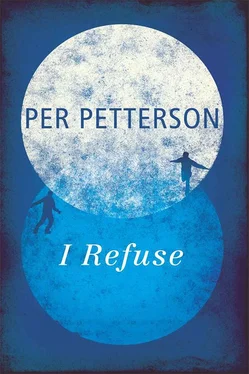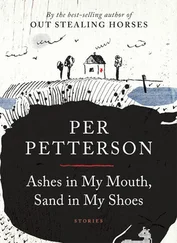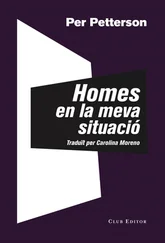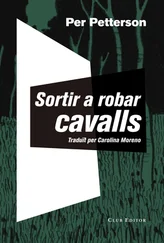Per Petterson - I Refuse
Здесь есть возможность читать онлайн «Per Petterson - I Refuse» весь текст электронной книги совершенно бесплатно (целиком полную версию без сокращений). В некоторых случаях можно слушать аудио, скачать через торрент в формате fb2 и присутствует краткое содержание. Год выпуска: 2014, Издательство: Vintage Digital, Жанр: Современная проза, на английском языке. Описание произведения, (предисловие) а так же отзывы посетителей доступны на портале библиотеки ЛибКат.
- Название:I Refuse
- Автор:
- Издательство:Vintage Digital
- Жанр:
- Год:2014
- ISBN:нет данных
- Рейтинг книги:5 / 5. Голосов: 1
-
Избранное:Добавить в избранное
- Отзывы:
-
Ваша оценка:
- 100
- 1
- 2
- 3
- 4
- 5
I Refuse: краткое содержание, описание и аннотация
Предлагаем к чтению аннотацию, описание, краткое содержание или предисловие (зависит от того, что написал сам автор книги «I Refuse»). Если вы не нашли необходимую информацию о книге — напишите в комментариях, мы постараемся отыскать её.
I Refuse — читать онлайн бесплатно полную книгу (весь текст) целиком
Ниже представлен текст книги, разбитый по страницам. Система сохранения места последней прочитанной страницы, позволяет с удобством читать онлайн бесплатно книгу «I Refuse», без необходимости каждый раз заново искать на чём Вы остановились. Поставьте закладку, и сможете в любой момент перейти на страницу, на которой закончили чтение.
Интервал:
Закладка:
A couple more boards, then the window was bare. They leaned forward. It wasn’t easy to see through the dirty glass because the sun was rising in the east, and they were at the back of the house in the west, but it wasn’t really dark. Not now. Everything in there was as it had been. It was four years ago, but it felt a lot longer. They were not the same people. Tommy wasn’t. All kinds of things had happened. Time had happened. He was thirteen years old then, he was seventeen now, going on eighteen. They were the longest years in the world. He didn’t know what to think, but he knew it was not by accident they were standing there, that he would have come here in the end, and even might have yearned to come, and when he did, it would do something to him, that he would look through the windows, as he was doing now, and see something he could take with him into his future life, something important he had not understood until exactly that moment, if he waited long enough and didn’t come here too early. He leaned forward with his forehead against the glass, and Jim did as he did, and for a minute or more they stood like that without speaking, looking in, and then Jim said:
‘It looks like the inside of a doll’s house.’
That was an odd thing to say. But it was true. Tommy saw it at once. Everything was pitch perfect inside in an almost surreal way, untouched, untouchable, everything in its right place. The chairs at the right angle before the TV. The pile of folded newspapers neatly stacked, corner to corner on the coffee table. Everything clean under the dust. The few pictures on the wall level with each other. The Zane Grey novels lined up on the shelf, not one book a millimetre out, as though the spines had been bought all in one piece and placed there to impress. They had been so meticulous about everything. Not a piece of clothing tossed on the floor, not a toy in a corner, not a ball. Everything meant to be as it had not been. It was meant to look like a home. The home of Tommy, Siri and the twins, two big children and the two small, and if anyone came to their house, they would soon see that everything was under control, that there was no need to call anyone, not the police, not child welfare, a little family was living here and they could manage on their own, and then they would be left in peace. Tommy, Siri and the twins. But now it was so easy to see that they had absolutely no idea what they were doing then, for Jim was right. It didn’t look like a home. It looked like the inside of a doll’s house.
Tommy straightened up and stepped two paces back. He wiped his hands on his trousers. He closed his eyes and brushed the muck off his forehead. He opened his eyes again. It wasn’t as he had thought it would be. He shouldn’t have come here, he should have waited even longer, but now it was too late.
Jim straightened up as well and walked back and stood beside Tommy and closed his eyes and brushed the dust and muck from his forehead and eyebrows, he sneezed twice, and said:
‘The house needs hoovering. On the outside. What do you think.’
‘About what,’ Tommy said.
‘What do we do now.’
‘Nothing.’
‘Right. Nothing what.’
‘Just burn the whole shit down.’
JIM ⋅ SEPTEMBER 2006 ⋅ 2005
I ENTERED THE Social Security office and carefully closed the door behind me. There was something about the light in the room, I thought, an unusual whiteness, it was unpleasant, but I could hardly wear my sunglasses inside, it wouldn’t help my case. I stood looking at the tables where several men, only men, sat hunched over forms they had been asked to fill in, some with a pen frozen in the air just above the paper, and there were several computers along the wall that the clients could use, and at the back, and in front of a desk, half sat, half stood a man desperately trying to explain a very important matter to the woman facing him, and the young woman was not looking merciful, and he was ill at ease, sending glances to both sides to check how many others could hear what he was saying, and I thought, how quickly this year has passed, I can’t understand what happened to it. How slowly it came and went. Each second was painful. Looking back from where I was standing, here, right now, in the middle of this floor, there was little I could remember apart from the nights I drove from this side of Oslo via the forests in Enebakk to the other side to go fishing from the bridge between Ulvøya and the mainland, close by Mosseveien. I do not remember the first time I went there or why, that’s true, but I had no trouble remembering Container Jon and his surprisingly red, almost pink, fingerless mittens in the half-dark only this morning and the gleaming line with the twenty shiny triple hooks on his rig and every single word we said to each other, every single fish I had caught. Not that they were many, neither words nor fish. I hadn’t lost my memory, it wasn’t that. I had no trouble remembering my mother, right up until the day she died, nor the fact that I had no idea what my father looked like, and yet thinking I had seen him several times, as late as in Herregårdsveien only a few hours ago, in the hills from Ljan down to the fjord, and that was more than strange because if anyone, anywhere, at any time had ever had a picture, a photo of my father in a box or a folder or at the bottom of a drawer at home, they had not shown it to me. The psychiatrist I had to see told me I dismissed things that happened to me too quickly, even the most important ones, he said, I didn’t carry them with me and that’s not good for you, he said. Right, I said, well, I suppose it isn’t, but why is it, then, that not long ago I got this leading position at the Oslo Libraries if everything that had happened to me up to that day I had dismissed too quickly. I must have carried something with me, I said, otherwise no one would have put their trust in me and appointed me, I said, because if nothing of what I had learned in life was of any use, but was more like empty boxes, no one would have given me a job, surely that is obvious, I said, to which he said it wasn’t what he meant, and I said, I am aware of that. But then he said, or maybe that’s exactly what I do mean. Because here you are.
He wasn’t stupid, of course.
I hadn’t been to my office since I had sick leave, and that I had after only three weeks, and it made me feel ashamed, and that was probably why I didn’t go in. There was no one I was close to, no one I should or could confide in, I knew nothing about any of them. To be honest, I didn’t want to go there at all, that was the truth, I had not paid attention, I had been looking to the wrong side, and in the rear-view mirror I could see I had already gone too far and everyone I saw was a stranger to me.
Once a month I had to see my boss to review my options and what we could do to get me back to work, if possible, but it was embarrassing for the both of us, and in the end I just dropped by his office and he wrote down in a log that I had been present, and then I left again. Fortunately it was in a different building, a long way from my own office.
The first time it happened I was in the hall putting my shoes on. It was early in the morning. I was alone, I lived alone. I was going in to this job, which still felt new to me after three weeks only, and I had to drive down the long hills to the railway station at the bottom of the valley, for it was too far to walk, and then park my car in the shadows behind the station building with all the others that were going in, catching the train to Oslo. Driving to the city centre during rush hour would be madness. And then all of a sudden I couldn’t breathe and tumbled against the wall and the coats hanging there from their pegs and pulled at least two of them down with me and crashed against the shoe rack, and there was a big plastic shoehorn stuck in behind the rack, and it hit me in the ribs like a spear, and it hurt so much I was about to start howling, which was something I often did in those days, when I was alone, pretty often in fact, it’s true, and it had been like that for quite a while, and I didn’t know why, but this time not a sound came out. I still couldn’t breathe, and I was afraid, of course, thinking this is the end of the line, but then it came back, the air, just as suddenly and hissed into my lungs which swelled up at once, and it was like a stab in my ribs. My God, how that hurt. My temples throbbed, and still lying on the floor by the shoe rack, I managed to coax my mobile phone out of my coat pocket and ring the woman I was once married to. The day it was all over she had said, I thought we would grow old together. No way, I had answered in a defiant, rather childish way, for I felt hurt beyond measure, but now I whispered, Eva, I’m on the floor, something has happened, you have to help me, I whispered, Eva, will you help me, please, and she rang off straight away, and I thought, is she really still that bitter, after all these years, but then she called back a few minutes later and said she had spoken to a doctor at the Central Hospital, and the doctor said I should keep totally calm and not to pull any stunts, so for God’s sake stay where you are and don’t move, Eva said, and I said, here in the shoe rack. Yes, she said, absolutely, if that’s where you landed, and finally, before ringing off, she said, well good luck, then, Jim, and thanks for the memories.
Читать дальшеИнтервал:
Закладка:
Похожие книги на «I Refuse»
Представляем Вашему вниманию похожие книги на «I Refuse» списком для выбора. Мы отобрали схожую по названию и смыслу литературу в надежде предоставить читателям больше вариантов отыскать новые, интересные, ещё непрочитанные произведения.
Обсуждение, отзывы о книге «I Refuse» и просто собственные мнения читателей. Оставьте ваши комментарии, напишите, что Вы думаете о произведении, его смысле или главных героях. Укажите что конкретно понравилось, а что нет, и почему Вы так считаете.












